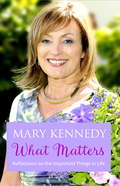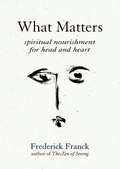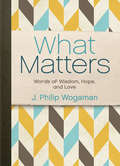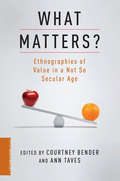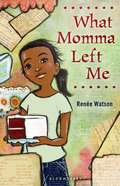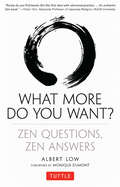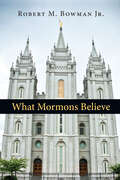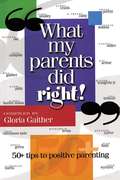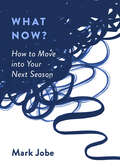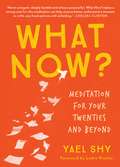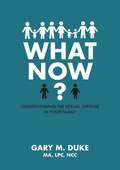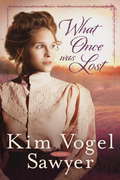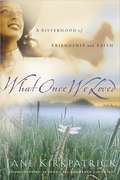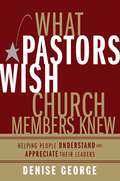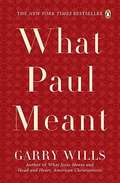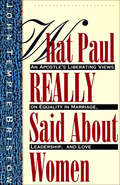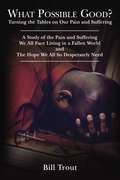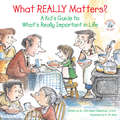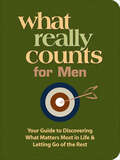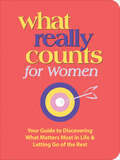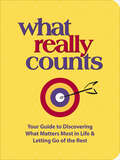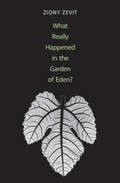- Table View
- List View
What Matters: Reflections on Important Things in Life
by Mary KennedyIn this book of consideration and appreciation, best-selling author and broadcaster Mary Kennedy takes stock of her life and those things most important in it. She considers what makes us strong, and how we can develop resilience in the world through knowing ourselves from within, and knowing our roots. She considers the nature of family and friendship too, and how a mother's role changes over time.Food, fashion, beauty - 'the eyes of the heart' - and the creative arts are all explored, along with honest reflections on the challenges and uncertainties of life, and how we maintain hope and faith in the face of loss. Ultimately, she asks how, as we get older, we can change our world for the better, for those who follow in our footsteps.What Matters is the perfect bedside book to read for solace and inspiration - and the ideal gift for someone important in your life.
What Matters: Spiritual Nourishment for Head and Heart
by Frederick FranckAfter his nearly 100 years of seeding, Franck's reflections on what really matters will help you to savor what truly matters in your own life. "Could the meaning of being born human be, to become Human?" This elegantly simple book of reflections presents the rich harvest of a lifetime of thinking, feeling, and seeing by an artist, whose vital spirituality has inspired hundreds of thousands of readers and students through his art, books, and workshops. The pithy, sometimes humorous, always wise contemplations reveal Franck's lifelong confrontation with the human in himself and others. Originally jotted down as reflections for himself and close friends, Franck's insights will challenge you to consider new ways of experiencing your spiritual path and to savor what truly matters.
What Matters: Words of Wisdom, Hope, and Love
by J. Philip WogamanIn this "letter" to the next generation, Wogaman, a pastor, ethicist, and grandfather draws on a wealth of experience to share what truly matters. Today’s young people yearn for authenticity and truth. However, the important aspects of truth, character, politics, community, family, education, religion, and vocation can get muddled by our cultural experiences. This book offers the opportunity to learn something from an older generation’s experience of what matters—and about what doesn’t matter much. What Matters addresses our broader cultural issues in the twenty-first century world. Explore why many young people have become disillusioned, even cynical, about major aspects of contemporary life. Wrestle with why is it hard to accept religious assumptions that were simply taken for granted in an earlier era. Contemplate the difficulty of seeing beyond the self-serving of many politicians. Come to appreciate why religious, political, economic, and educational institutions still matter. By tackling our tough questions about today’s world, we can come to better understand what’s truly worth believing in, and how our decisions and actions build a life that matters.
What Matters?: Ethnographies of Value in a Not So Secular Age (A Columbia / SSRC Book)
by Ann Taves Courtney BenderOver the past decade, religious, secular, and spiritual distinctions have broken down, forcing scholars to rethink secularity and its relationship to society. Since classifying a person, activity, or experience as religious or otherwise is an important act of valuation, one that defines the characteristics of a group and its relation to others, scholars are struggling to recast these concepts in our increasingly ambiguous, pluralistic world.This collection considers religious and secular categories and what they mean to those who seek valuable, ethical lives. As they investigate how individuals and groups determine significance, set goals, and attribute meaning, contributors illustrate the ways in which religious, secular, and spiritual designations serve as markers of value. Reflecting on recent ethnographic and historical research, chapters explore contemporary psychical research and liberal American homeschooling; the work of nineteenth and early-twentieth-century American psychologists and French archaeologists; the role of contemporary humanitarian and volunteer organizations based in Europe and India; and the prevalence of highly mediated and spiritualized publics, from international psy-trance festivals to Ghanaian national political contexts. Contributors particularly focus on the role of ambivalence, attachment, and disaffection in the formation of religious, secular, and spiritual identities, resetting research on secular society and contemporary religious life while illuminating what matters in the lives of ordinary individuals.
What Momma Left Me
by Renee WatsonWhat if your daddy did the worst thing in the world? And what if you were never going to see your momma again? How do you remake your life when you are only thirteen years old? * * * * * * * * Serenity knows she is good at keeping secrets, and she's got a whole lifetime's worth of them. Her momma is dead, her daddy's gone, and starting life over at her grandparents' house is strange. Luckily, certain things seem to hold promise: a new friend, a new church, a new school. But when her brother starts making poor choices, and her grandparents hold to a faith that Serenity isn't sure she understands, it is the power of love--in all its forms--that will repair her heart and keep her sure of just who she is. Renee Watson's talent shines in this powerful and ultimately uplifting first novel, celebrating one girl's gift for finding joy in the darkest times of life.
What More Do You Want?
by Albert Low Monique Dumont Jeffrey FrithWe've all had moments in our lives when we've thought, "Something is missing. There must be more to life than this." It is this sense that often brings people to the practice of Zen. By turning to Zen, they acknowledge that this "something" lies not in externals, but rather in seeking to transcend desire and attachment. The journey toward that transcendence begins with questioning, and questions will be part of the path until awakening is attained.In What More do You Want? a fascinating new book by renowned Zen master Albert Low, he addresses some of the questions students have posed about the practice of Zen: Why do we practice? Why should we seek to understand our reasons for practicing? How can we distinguish between true and false practice? What is awakening? In addition, Low shares with his readers four teishos-talks that comment on a text or koan in order to enhance meditation practice-on zazen or seated meditation, on pain and suffering, and on the very nature of practice itself. Finally, Low shares with readers an experience of satori, a glimpse into Buddha nature.All readers, both novice and longtime practitioners, will encounter in this book new answers, and new questions, to the what, why and how of Zen practice.
What More Do You Want?
by Albert Low Monique Dumont Jeffrey FrithWe've all had moments in our lives when we've thought, "Something is missing. There must be more to life than this." It is this sense that often brings people to the practice of Zen. By turning to Zen, they acknowledge that this "something" lies not in externals, but rather in seeking to transcend desire and attachment. The journey toward that transcendence begins with questioning, and questions will be part of the path until awakening is attained.In What More do You Want? a fascinating new book by renowned Zen master Albert Low, he addresses some of the questions students have posed about the practice of Zen: Why do we practice? Why should we seek to understand our reasons for practicing? How can we distinguish between true and false practice? What is awakening? In addition, Low shares with his readers four teishos-talks that comment on a text or koan in order to enhance meditation practice-on zazen or seated meditation, on pain and suffering, and on the very nature of practice itself. Finally, Low shares with readers an experience of satori, a glimpse into Buddha nature.All readers, both novice and longtime practitioners, will encounter in this book new answers, and new questions, to the what, why and how of Zen practice.
What Mormons Believe
by Robert M. Bowman Jr."The Church of Jesus Christ of Latter-day Saints is as American as apple pie," writes Robert Bowman in this booklet-length introduction to the Mormon faith. Addressing the growing curiosity of the American public, Bowman leads with a synopsis of former governor Mitt Romney's Mormon heritage and then recounts the history of the Church of Latter-day Saints (LDS) from Joseph Smith and Brigham Young to the present. Bowman concludes with a summary of the unique tenets of faith arising from the Book of Mormon, pointing out places of divergence from typical evangelical readings of the Bible. Bowman's snapshot of this most American of all religious movements makes for essential reading as we enter election season.
What My Parents Did Right!
by Gloria GaitherThe message of this powerful book is that you don't have to be a perfect person to be a great parent. In it you will find fascinating stories written by people like John MacArthur, Jr., Kay Arthur, Joni Eareckson Tada, Janette Oke, Gary Smalley, Frank Peretti, and many more. From them you'll learn more than fifty tips to positive parenting -- tips you can incorporate in your own family today -- principles that will help ensure that you, too, do something right!
What Now?: How to Move into Your Next Season
by Mark JobeI want to live God&’s calling, but where do I begin?Be it in the midst of a spiritual lull, a midlife crisis, or an unforeseen pandemic, at some point all Christians feel the need to readdress and reorient to move toward God&’s calling for their lives. What Now? is for anyone who wants to emerge from stagnation and envision what could be best for their next season of life. You&’ll learn how to:Be still and discern God&’s will for your lifeRe-envision the possibilities of your calling Turn away from isolation and turn to healthy communityBoldly step out into the unknown with faithDon&’t let confusion or fear of the unknown keep you from moving toward the fullness of God&’s plan for your life. Instead, learn to listen to the spiritual whisper directing you to the next stage in your divine calling. As you long to live differently and find your heart awakening to new possibilities, What Now? will help you step forward bravely.
What Now?: How to Move into Your Next Season
by Mark JobeI want to live God&’s calling, but where do I begin?Be it in the midst of a spiritual lull, a midlife crisis, or an unforeseen pandemic, at some point all Christians feel the need to readdress and reorient to move toward God&’s calling for their lives. What Now? is for anyone who wants to emerge from stagnation and envision what could be best for their next season of life. You&’ll learn how to:Be still and discern God&’s will for your lifeRe-envision the possibilities of your calling Turn away from isolation and turn to healthy communityBoldly step out into the unknown with faithDon&’t let confusion or fear of the unknown keep you from moving toward the fullness of God&’s plan for your life. Instead, learn to listen to the spiritual whisper directing you to the next stage in your divine calling. As you long to live differently and find your heart awakening to new possibilities, What Now? will help you step forward bravely.
What Now?: Meditation for Your Twenties and Beyond
by Yael ShyBuddhist teachings and meditation offer a roadmap to help college students and others in early adulthood incorporate mindfulness into their lives as a means of facing the myriad struggles unique to this stage of life.Early adulthood is filled with intense emotions and insecurity. What if you never fall in love? What if you can't find work you’re passionate about? You miss home. You miss close friends. You’re lost in the noise of how you think you should be living and worried about wasting what everyone says should be the best years of your life.What Now? shares mindfulness practices to help twentysomethings learn to identify and accept these feelings and respond—not react—to painful and powerful stimuli without pushing them away or getting lost in them. This is not about fixing oneself or being "better." Readers are encouraged to embrace themselves exactly as they are. You are already completely whole, completely loveable, completely worthy. What Now? shares practices that help us to wake up to this fact. This uniquely tumultuous developmental period is a time when many first live away from home and engage in all kinds of experimentation—with ideas, substances, relationships, and who we think we are and want to be in the world. Yael Shy shares her own story and offers basic meditation guides to beginning a practice. She explores the Buddhist framework for what causes suffering and explores ideas about interconnection and social justice as natural outgrowths of meditation practice.
What Now?: Understanding the Sexual Offense in Your Family
by Gary DukeNot long after I began treating sex offenders, I learned of the many challenges faced by their family members. I felt their pain as I learned of their plight. One case brought a new perspective into my view. An offender had molested his fourteen-year-old daughter. As a result, all three of his children were placed in foster-care and adopted. His wife had nothing to do with the offense. Her crime was being married to the offender and continuing to love and support him.A secondary victim is someone who is negatively affected by the offense but not directly involved. The consequences of being the family member of a sex offender are many. Society sees them as co-defendants at worse or ignorant losers at best. After all, why would someone choose to support and accept a sex offender? The partners and children of offenders often live under the same scrutiny as the offender himself. Many of the laws and restrictions affect them also. Even worse, few people seem to care.Secondary victims suffer in silence. They are in my eyes &“the forgotten ones&”. This is why I wrote this book. When a sex offense occurs in the home there are far more questions than answers. I imagined a wife or daughter of a sex offender whose world has been rocked by sexual assault reaching for answers. What Now? Understanding the Sexual Offense in Your Family is an attempt to bring some order and clarity to a home filled with chaos. It is filled with insight, answers, information and hope. In between the lines is a heart of passion beating for the men and women who society sees as expendable and the people that still love them in spite of it all.
What Once Was Lost: A Novel
by Kim Vogel SawyerA woman meant to serve, a child in the dark, a man standing apart--can these three souls embrace a God with new plans for them? On a small Kansas farm, Christina Willems lovingly shepherds a group of poor and displaced individuals who count on her leadership and have come to see the Brambleville Asylum for the Poor as their home. But when a fire breaks out in the kitchen leaving the house uninhabitable, she must scramble to find shelter for all in her care, scattering her dear "family." With no other options, Christina is forced to approach Levi Jonnson, a reclusive mill owner, to take in a young blind boy named Tommy Kilgore. Levi agrees with reluctance but finds himself surprised by the bond that quickly grows between him and Tommy. As obstacles to repairing the farm pile up against Christina, she begins to question her leadership ability and wonders if she can fulfill the mission to which she's dedicated her life. And when an old adversary challenges Christina, will she find an unlikely ally--or more--in the aloof Levi? Can Levi reconcile with the rejection that led to his hermit-like existence and open his heart and life to something more, especially a relationship with a loving God?
What Once We Loved (Kinship and Courage #3)
by Jane KirkpatrickA CIRCLE OF COURAGEOUS WOMEN DISCOVERS THE MEANING OF INDEPENDENCE, FORGIVENESS, AND LOVE Ruth Martin had a dream: to become an independent woman and build a life in southern Oregon for herself and her children. But when her friend Mazy's inaction results in a tragedy that shatters Ruth's dream, Ruth must start anew and try to heal her tender wounds. Her friends are also moving on. Mazy wrestles with her understanding of what faith and family really mean; Tipton discovers that marriage requires more than she's ready to give; and Suzanne's challenge is to keep seeing with new eyes. Together, the turn around women travel to arenas of untested promise where they'll find a hope that sustains them and relationships they'll cherish all their days. THE FINAL BOOK IN THE KINSHIP AND COURAGE SERIES
What Pastors Wish Church Members Knew: Helping People Understand and Appreciate Their Leaders
by Denise GeorgePastors face a nearly impossible position! Even happy, healthy pastors struggle with pressures, pains, and fears unique to their position. If pastors were given an opportunity to speak honestly, openly, and anonymously about themselves, their families, and their churches, what would they say? What Pastors Wish Church Members Knew provides that opportunity. Based on anonymous and honest interviews and surveys, a national cross-section of hundreds of pastors speak out about their personal life, faith, health, wife, children, finances, greatest joys, frustrations, disappointments, greatest fears, and dreams. And you’ll learn how you can better help and encourage your pastor. This is insightful and encouraging reading for anyone who cares about the future of the church. This is a companion to the book What Women Wish Pastors Knew.
What Paul Meant (Thorndike Inspirational Ser.)
by Garry WillsIn his New York Times bestsellers What Jesus Meant and What the Gospels Meant, Garry Wills offers fresh and incisive readings of Jesus' teachings and the four gospels. Here Wills turns to Paul the Apostle, whose writings have provoked controversy throughout Christian history. Upending many common assumptions, Wills argues eloquently that Paul’s teachings are not opposed to Jesus' message. Rather, the best way to know Jesus is to discover Paul. In this stimulating and masterly analysis, Wills illuminates how Paul, writing on the road and in the heat of the moment, and often in the midst of controversy, galvanized a movement and offers us the best reflection of those early times.
What Paul Really Said About Women
by John Temple BristowA challenge to the traditional understanding of St. Paul's epistles and sexism in today's church.
What Paul Really Said About Women: An Apostle's Liberating Views on Equality in Marriage, Leadership, and Love
by John Temple BristowJohn Temple Bristow’s What Paul Really Said About Women challenges the traditional understanding of St. Paul's epistles and sexism in the modern church.Attempting to reconcile the Apostle Paul’s scripture about women being submissive to men in Ephesians 5 with his words in Galatians 3 that there is no male or female and everyone is “one in Christ Jesus”, John Temple Bristow uncovered differences between Paul’s original Greek Ephesians writings and the English version translation that indicates a deliberate alteration of the text’s meaning in favor of men. Provocative and revelatory, Bristow’s book explores not only What Paul Really Said About Women, but the history and culture of the church that misinterpreted his message.“A convincing case for equality of the sexes based on the very passages that are all too often used as proof texts to uphold male dominance and female subordination. . . . For any person who reveres scripture but who struggles with traditional interpretations of passages concerning women and who fears that a desire for equality between the sexes is a violation of biblical principles, this book is a must.” —Letha Dawson Scanzoni, co-author of All We’re Meant to Be“Bristow acquits Paul of misogyny and restores him to his rightful stature as a great architect of human liberation. Even more importantly, Bristow urges contemporary churches . . . to follow the radically egalitarian vision of the apostle Paul.” —Virginia Ramey Mollenkott, author of Women, Men, and the Bible“Cuts through much misguided rhetoric to display the actual enhancement of women’s status in early Christian culture.” —Timothy L. Smith, author of Called Unto Holiness
What Possible Good?: Turning the Tables on Our Pain and Suffering A Study of the Pain and Suffering We All Face Living in a Fallen World and The Hope We All So Desperately Need
by Bill TroutIn the midst of our own intense storms of life, we desperately search for an anchor of hope. This book by author Bill Trout takes us on a journey towards gaining a better understanding of our pain and suffering. We will find that God alone is the one true steadfast anchor that we seek. Believers in Jesus are firmly secured to God as our anchor by a heavenly chain of very strong links. One of the most vital links is found in the answer to the following question: &‘What possible good could come from our suffering?&’ There is great news! God can and does turn bad things into good things for us. To see him at work in our lives we need to ask God to open our spiritual eyes. To improve our vision of the Master Potter at work, we will look through a number of different spiritual lenses. Each lens will permit us to see a different Biblical perspective of viewing our pain and suffering. Not only will we see a broad range of the possible causes and sources of our trials, but also we will discover additional links in the chain of hope, which may have eluded us thus far. Though we have a natural tendency to blame God for our pain and suffering, we will learn that the devil is the primary cause for most of the trials we face. But more great news! As we grow in our faith and trust in God, we realize that he is an expert at &‘turning the tables&’ on all of the devil&’s deceptive schemes to tempt, torture and destroy us. God clearly &“works for the good of the those who love him, who are called according to his purpose.&” (Romans 8:28) He is the master of turning potential defeat into decisive victory! If we hold tight to him as our anchor, we can safely and securely ride out all of the storms of life until we reach that promised eternal heavenly shore!
What REALLY Matters?
by R. W. Alley Brother John Mark FalkenhainOne of the most important gifts we can offer a child is passing along to them the values that will help them form their own sense of what is important--a sense of what REALLY matters. In What Really Matters? A Kid's Guide to What's Really Important in Life, author John Mark Falkenhain, O.S.B., helps both children and adults reflect on those things in life which are most important, especially respect, relationships, and love.
What Really Counts for Men: Your Guide to Discovering What Matters Most in Life & Letting Go of the Rest
by Thomas Nelson PublishersSift through the daily grind to make the best choices for yourself and your loved ones and discover what will elevate your reality and life experience.Meaning. Purpose. Calling. Vision. Whatever you name it, we are all searching for something that matters. Something that counts. We want to know that we’re concentrating on the right things and that we’re not missing the point.What Really Counts for Men tackles twenty-two areas of significance to men—including God, Love, Wisdom, Purpose, Health—and explores what matters most in each of them, answering questions like What are the basic truths? and What is most important?With introductions, meditations, and directed journaling sections on each topic, men will embark on an interactive journey to discover not only what really counts, but also what doesn’t, further drawing focus to their purposes within the context of God’s call for them.
What Really Counts for Women: Your Guide to Discovering What Matters Most in Life & Letting Go of the Rest
by Thomas Nelson PublishersA handbook on setting your spiritual priorities straight—filled with inspirational stories, thought-provoking quotes, and life-changing Scripture verses.Meaning. Purpose. Calling. Vision. Whatever you name it, we are all searching for something that matters. Something that counts. We want to know that we’re concentrating on the right things and that we’re not missing the point.What Really Counts for Women tackles twenty-two areas of significance to women—including God, Love, Wisdom, Purpose, Health—and explores what matters most in each of them, answering questions like What are the basic truths? and What is most important?With introductions, meditations, and directed journaling sections on each topic, women will embark on an interactive journey to discover not only what really counts, but also what doesn’t, further drawing focus to their purposes within the context of God’s call for them.
What Really Counts: Your Guide to Discovering What Matters Most in Life & Letting Go of the Rest
by Thomas Thomas Nelson PublishersHow to navigate the day-to-day struggle for meaning, success, and happiness by sharpening your focus on the spiritual necessities.Meaning. Purpose. Calling. Vision. Whatever you name it, we are all searching for something that matters. Something that counts. We want to know that we’re concentrating on the right things and that we’re not missing the point.What Really Counts tackles twenty-two areas of significance—including God, Love, Wisdom, Purpose, Health—and explores what matters most in each of them, answering questions like What are the basic truths? and What is most important?With introductions, meditations, and directed journaling sections on each topic, readers will embark on an interactive journey to discover not only what really counts, but also what doesn’t, further drawing focus to their purposes within the context of God’s call for them.
What Really Happened in the Garden of Eden?
by Ziony ZevitA provocative new interpretation of the Adam and Eve story from an expert in Biblical literature.The Garden of Eden story, one of the most famous narratives in Western history, is typically read as an ancient account of original sin and humanity&’s fall from divine grace. In this highly innovative study, Ziony Zevit argues that this is not how ancient Israelites understood the early biblical text. Drawing on such diverse disciplines as biblical studies, geography, archaeology, mythology, anthropology, biology, poetics, law, linguistics, and literary theory, he clarifies the worldview of the ancient Israelite readers during the First Temple period and elucidates what the story likely meant in its original context.Most provocatively, he contends that our ideas about original sin are based upon misconceptions originating in the Second Temple period under the influence of Hellenism. He shows how, for ancient Israelites, the story was really about how humans achieved ethical discernment. He argues further that Adam was not made from dust and that Eve was not made from Adam&’s rib. His study unsettles much of what has been taken for granted about the story for more than two millennia—and has far-reaching implications for both literary and theological interpreters.&“Classical Hebrew in the hands of Ziony Zevit is like a cello in the hands of a master cellist. He knows all the hidden subtleties of the instrument, and he makes you hear them in this rendition of the profoundly simple story of Adam, Eve, the Serpent, and their Creator in the Garden of Eden. Zevit brings a great deal of other biblical learning to bear in a surprisingly light-hearted book.&”―Jack Miles, author of God: A Biography
